HMR Institute of Technology & Management had started offering the B. Tech. Degree in Electrical and Electronics Engineering in 2004. The program provides latest technological knowledge in emerging areas of Electrical Engineering & Electronics Engineering. Electrical and Electronics Engineering continues to transform the way we live from the latest consumer products to Sophisticated Scientific, Industrial and Healthcare Technologies. Electrical and Electronics Engineering is a field of engineering that generally deals with the study and Application of Electricity, VLSI Technology and Artificial Intelligence technique etc. in the field of Engineering.
Integrating latest computer programming, electronics and communication with electrical engineering, makes this discipline the most interesting branch of engineering. Job opportunities are ample in both Private and Public sector like Railways, Metros, Civil Aviation, Power Sectors, and Utility Companies, Electrical Design and Consultancy Firms and all types of Manufacturing Industry.
The technology deployed had several advantages over conventional technologies in terms of cost, size and power consumption. The Department of Electrical & Electronics Engineering, is committed to mould the students for global requirements by providing quality education to meet the needs of the industry. The Department has young and dynamic personalities as faculty members, from reputed institutes like NITs, DTU and reputed Government Engineering colleges who have been motivating the students for getting the best out of them.
The department of EEE aims at being the world class centre in Electrical Engineering education through excellent teaching, applied research and professional services, for the benefit of the society. The department is having well equipped state-of-art laboratories and research facilities. The department focuses on overall development of the students imparting knowledge and skill through projects and seminar presentations and encourages students’ association activities, internships and industrial visits. Value added Programmes (VAPs), Education and Professional Ethics are also an integral part of the curriculum.
Vision
Mission
M1: To nurture and mentor students with latest technologies to improve their skill and enhance knowledge to face global challenges
M2: To promote “Learn by Doing” concept by which productivity is achieved through practice, self- perfection and minor innovation so that student learn and their learning translates into a range of personal, Social and Developmental benefits.
M3: Industry and Institutional collaborative value added programmes to build opportunities and learning for students with the ongoing interaction.
M4: To open up opportunities for activities and learning experience where students develop personal, social skills and attitudes as they interact by sharing, discussing, acting responsibly, using different forms of communication and accepting diversity.
Programme Educational Objectives (PEOs)
PEO 1: Graduates shall have strong foundation in basic sciences, mathematics, Engineering fundamental and in electrical and electronics engineering subjects in addition to proficiency to computer programming and use of modern tools and technologies.
PEO 2:Graduates will be successfully engaged in careers in electrical and electronics engineering and allied fields as eminent engineers and managers.
PEO 3:Graduates will be prepared for continued professional development through postgraduate studies in engineering and allied fields and through life-long learning.
PEO 4:Graduates will have demonstrated practices and skills in professional attitude, teamwork, leadership, values, ethics and communication.
Programme Outcome (POs)
PO 1: Engineering knowledge: Apply the knowledge of mathematics, science, engineering fundamentals, and an engineering specialization to the solution of complex engineering problems.
PO 2: Problem analysis: Identify, formulate, research literature, and analyse complex engineering problems reaching substantiated conclusions using first principles of mathematics, natural sciences, and engineering sciences.
PO 3: Design/development of solutions: Design solutions for complex engineering problems and design system components or processes that meet the specified needs with appropriate consideration for the public health and safety, and the cultural, societal, and environmental considerations.
PO 4: Conduct investigations of complex problems: Use research-based knowledge and research methods including design of experiments, analysis and interpretation of data, and synthesis of the information to provide valid conclusions.
PO 5: Modern tool usage: Create, select, and apply appropriate techniques, resources, and modern engineering and IT tools including prediction and modelling to complex engineering activities with an understanding of the limitations.
PO 6: The engineer and society: Apply reasoning informed by the contextual knowledge to assess societal, health, safety, legal and cultural issues and the consequent responsibilities relevant to the professional engineering practice.
PO 7 : Environment and sustainability: Understand the impact of the professional engineering solutions in societal and environmental contexts, and demonstrate the knowledge of, and need for sustainable development.
PO 8: Ethics: Apply ethical principles and commit to professional ethics and responsibilities and norms of the engineering practice.
PO 9: Individual and team work: Function effectively as an individual, and as a member or leader in diverse teams, and in multidisciplinary settings.
PO 10: Communication: Communicate effectively on complex engineering activities with the engineering community and with society at large, such as, being able to comprehend and write effective reports and design documentation, make effective presentations, and give and receive clear instructions.
PO 11:Project management and finance: Demonstrate knowledge and understanding of the engineering and management principles and apply these to one’ sown work, as a member and leader in a team, to manage projects and in multidisciplinary environments.
PO 12:Life-long learning: Recognize the need for, and have the preparation and ability to engage in independent and life-long learning in the broadest context of technological change.
Programme Specific Outcome (PSOs)
PSO 1: Use logical & technical skills to model, simulate and analyse electrical components and systems.
PSO 2: Integrate the knowledge of fundamental electronics, power electronics and embedded systems for the controllability, reliability and sustainability of electrical systems.
PSO 3: Contribute for the development of smart power grid and integrating green energy on it to meet the increasing demand of the society.
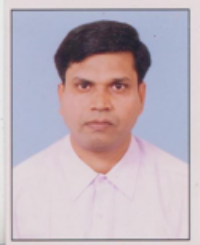
Dr. U.K. Choudhury
Professor & HoD
- B.E, M.E, Ph.D
- Application of AI in Power System
- uk.choudhury@hmritm.ac.in
Brief Profile
Labs & Infrastructure
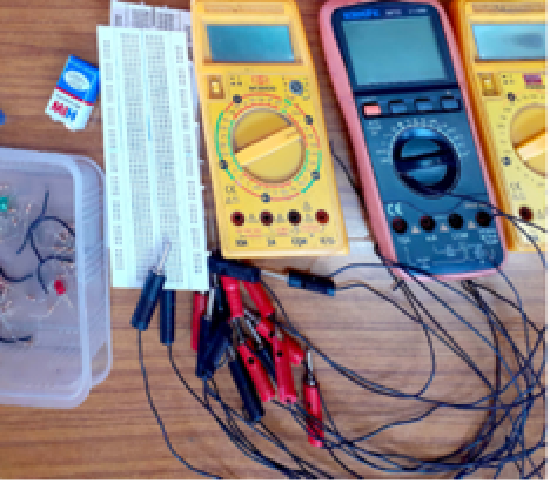
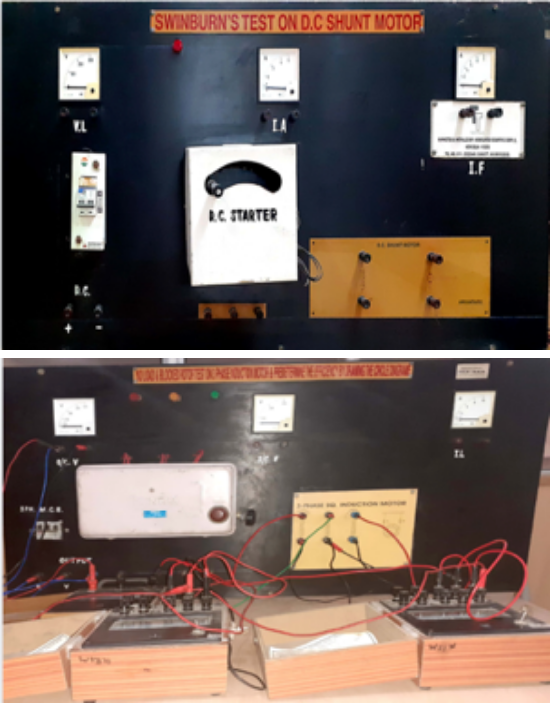
Electrical Machine LAB
Each machine is provided with a work bench having well designed movable connecting panels made from thick hylum sheet (with attractive printing on it). Other major equipment includes general-purpose rotating electrical machines & test benches, a variety of single phase & 3 phase transformers, synchronous / DC machine sets and variable-frequency inverters.
Electrical Measurements LAB


Control & Automation LAB
Electrical Workshop
The workshop provides basic practical knowledge about Electrical and Electronics on.
- Familiarization of different types electronic components and measuring instruments
- PCB fabrication and soldering.
- Identification of PC hardware parts and familiarization of microprocessor trainer kits
- House wiring practice and working of electrical protective devices
- Functioning of some commonly used home appliances and different types of electric lamps.
In addition to regular experiments, students take on mini-projects as a part of their workshop practice. During this process, students gain confidence in executing electrical and electronic projects irrespective of their branch of engineering. At the end of the semester, a project exhibition is presented, and this, in turn, motivates students to create more complex projects and to attempt competition in future project exhibitions.
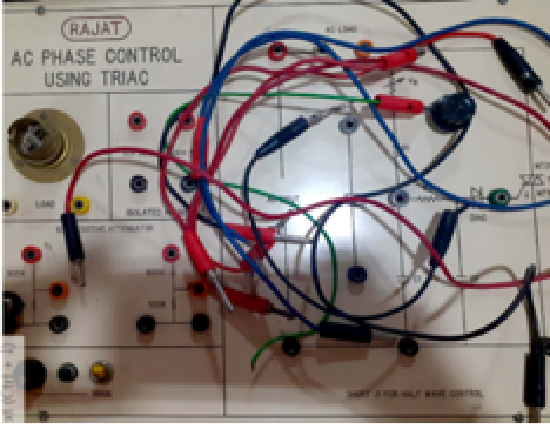
Power System & Simulation LAB
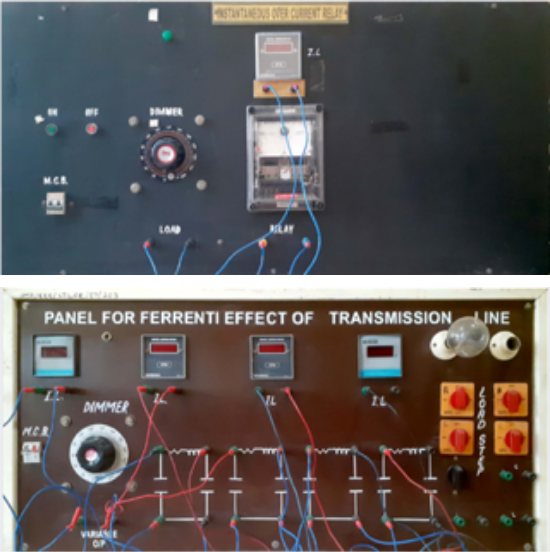

Power Electronics & Electrical Drives LAB
Welcome to the department of Electrical and Electronics Engineering at HMR Institute of Technology & Management, Delhi. The department is located in a sprawling environment with a state of art facilities and highly qualified faculty. The department works with the objective of addressing critical challenges faced by the Industry, society and the academia. Perhaps even more important is our unceasing commitment to our students, helping them to learn, grow, develop, and achieve their goals in their pursuit to excel in their professional career. The department was established in the year 2004 and since its inception the department is offering Electrical & Electronics Engineering undergraduate courses.
The department faculty works with excellent team spirit in different technical teams like Power Electronics, Power System, Renewable Energy, Signal Processing, VLSI, Embedded System, Communication which leads to key research publications in these areas. The department strives to provide a conductive environment for the students to develop analytical and practical skills and apply them to real world problems. To motivate the students the department organizes regular training in state of art software & hardware, arranges workshop, National & International Conferences periodically and has IEEE student chapter of HMRITM.
We welcome you to the Electrical and Electronics Engineering Department as undergraduate student and we hope to be part of your success.
Thanks for Visiting
| S. No | Batch | Rank | Roll No. | Name | Passing % |
| 1 | 2012-2016 | 1st | Saman Malik | ||
| 2nd | Jigyasa Mehta | ||||
| 3rd | ChanchalGoel | ||||
| 2 | 2013-2017 | 1st | Varun | ||
| 2nd | Imran | ||||
| 3rd | Himanshu | ||||
| 3 | 2014-2018 | 1st | Nikita Tyagi | ||
| 2nd | DheerajPandey | ||||
| 3rd | Himanshu Sharma | ||||
| 4 | 2015-2019 | 1st | Ramanand | ||
| 2nd | Amit Singh | ||||
| 3rd | Riya Gupta |
- Seminar on “Rooftop Solar” emphasizing on Importance, availability and scope in india, By Mr. KaushikSanyal M.D. TPDDL. It was organized by Mr. Chandrajeet Singh which was attended by 150+ students and Faculty of EEE Department.
- Paper Published in international journal IJSART on “Review of Routing Protocol in Wireless sensor network” By Mr. Vikash Malik and Mr. Ajay Dahiya.
- Seminar on “Smart Grid” emphasizing on Current scenario and future scope in india, By Mr. Amir Husain Khan. It was organized by Mr. Chandrajeet Singh which was attended by 150+ students and Faculty of EEE Department.
- Workshop on “PLC & SCADA” By Mr. Satpal Singh, Aptron Training and Placement Company. It was organized by Mr. Vijay Rohilla which was attended by 2nd and 3rd year students and Faculty of EEE Department.
- Paper Published in international Journal of Current Trends in Engineering and research on “Review of Various controllers for Grid connected PV system” By Dr. AnuradhaTomar.
- Paper Published in international Journal of Current Trends in Engineering and research on “Active Power control in Grid Connected PV system vol.2 issue 10” By Dr. AnuradhaTomar and Students under guidance.
- Paper Published in international Journal of Current Trends in Engineering and research on “Selecting wire and cable for solar PV application” By Dr. AnuradhaTomar.
- Paper Published in IEEE international conference on power electronics July 2016 on “Multi input Single DC-DC converter based PV water pumping system. output” By Dr. AnuradhaTomar.
- Mr. C.J. Singh Attended Quality improvement program Organized in DTU.
- Industrial visit to Pragati power corporation ltd. By 38 students of EEE 3rd year organized by Mr. Nitin Gupta and Mr. Devvrat.
